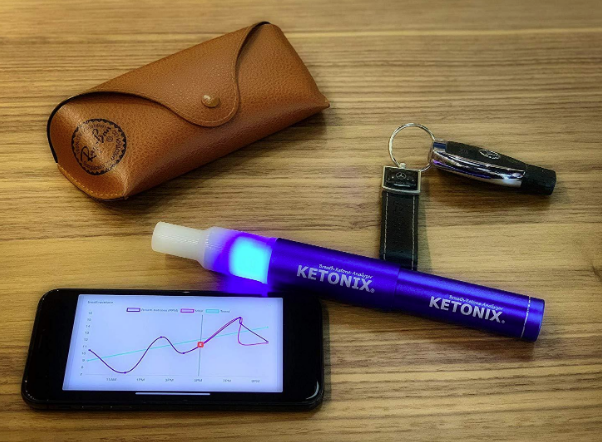What Are Ketones and How to Measure Them.

Sometimes it can take a while for your body to get into ketosis, even up to one to three weeks, and it can be tricky to know when exactly you are in ketosis. There may be some signs that you can use to generally gauge whether you are in ketosis, such as feeling more energetic and seeing weight loss and diminishing body fat. However, these methods are inexact and very speculative, which is why we measure ketones in our body to determine accurately whether we are in ketosis or not.
Ketones are actually a byproduct of your body shifting into fat burning mode. This happens when your body has no more glycogen stores and when glucose is no longer available for energy consumption, which mobilizes fatty acids and increases ketones in your body as a source of energy.
So when you go into ketosis, the presence of these ketones are a surefire way to determine whether you are in ketosis.
Fat is actually a more efficient form of fuel for the body than sugar. The heart operates more efficiently when running on ketones, and ketones are also super healthy for the brain. When you are in ketosis, the level of ketones in your blood stream will vary throughout the day. For example, your ketone levels will probably be highest in the morning after you have fasted all night while sleeping, and your ketone levels will probably be lowest after you’ve had a large meal.
That’s why the best method for testing your ketone levels is ketone breath testing. These ketone breath meter devices are very accurate in testing for ketones in the form of acetone, which will then allow you to determine whether you are in ketosis or not. Best of all, once you buy the breath testing device, you can use it over and over again without having to pay for additional test strips, which would be mandatory for blood testing devices. These breath testing devices last for years so they are very cost-effective and you can use them multiple times everyday.
Keto Drinks and Pills
One thing that keto practitioners need to be wary of are exogenous ketones. These are mostly fake keto products like drinks and pills that promise to put you into ketosis by way of ingesting ketones. However, this is pseudoscience, because ingesting ketones does not put you into nutritional ketosis. Not only does artificially placing ketones into your body not cause your body to go into fat burning mode, these artificial ketones may make it impossible to test for whether you are actually in ketosis, because ketone breath testing devices might not be able to distinguish between the real ketones and artificial ketones in your body. So stay away from these ketone drink and pill products that don’t actually work and may even harm you.
MCT Oil
If you want to raise your ketone levels naturally, take MCT oil, which you can add into your coffee, tea or water. MCT stands for medium chain triglycerides, which goes directly to your liver and brain and assists in the production of ketones to help you lose weight faster. MCT oil is also exceptionally good for your brain.
Keto Strips
So let’s talk about how to measure these ketones in your body to determine whether or not you are actually in ketosis. Before discussing the best way to test for ketones, we should discuss the methods that don’t actually work first. Many people on keto use urine test strips to measure their ketone levels, but these test strips are notorious for being inaccurate. Urine test strips only measure one type of ketone in your urine, acetoacetate. However, the ketones that are present in urine are actually the excess ketones that were not expended for energy and end up as waste, so they are more of an indirect gauge of the amount of actual ketones in your system. Additionally, when you first enter the state of ketosis, your body is still adjusting to the process of burning ketones for energy and can be inefficient in the beginning stages, which can result in excess ketones being dumped. However, once your body becomes efficient at processing and burning ketones, there will be fewer ketones that will end up in your urine, which a keto test strip would interpret that you’re not in ketosis, even though you may actually be deep in ketosis. So these keto test strips can indicate that you’re in ketosis when you’re actually not, and they can even indicate that you’re not in ketosis when you actually are. In general it’s best to stay away from these inaccurate products.
Ketone Meters
There are two accurate methods for measuring ketones in your body, which are ketone breath meters and ketone blood meters. Ketone blood testing machines are actually made for diabetics and use prescription test strips that test for ketoacidosis. One type of strip tests for ketones in the form of beta hydroxybutyrate while the other tests for glucose. However, these blood test strips are very expensive and can cost around $5-10 for just 10 strips. While these tests are very accurate, they were designed for diabetics and are just not very practical or cost-effective for keto practitioners.
When you take MCT oil supplements, they can help you get your total fat requirements for the day. Also when you get started on MCT oil, you want to start slowly with about a quarter teaspoon each day for about a week, and then you can increase the amount you are taking each week until you are taking about one full tablespoon each day. This will allow your stomach to gradually adjust to MCT oil, as it can cause digestion issues for some people who are new to it.
